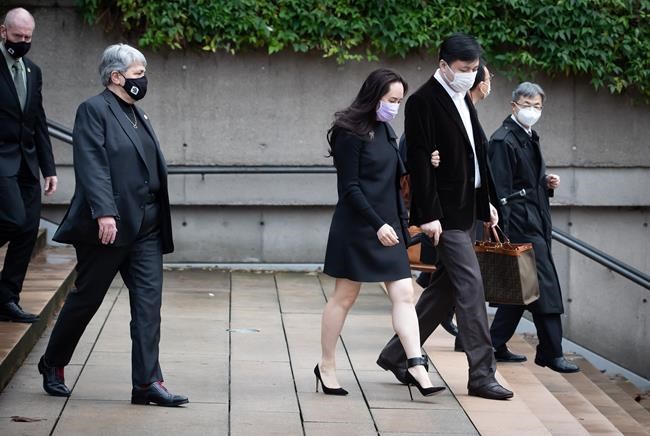VANCOUVER — A senior manager with the Canada Border Services Agency says she was instructed not to take notes after the arrest of Huawei executive Meng Wanzhou — an arrest that will be under court scrutiny next year.
Nicole Goodman was chief of passenger operations at Vancouver's airport when Meng was arrested there following a border exam on Dec. 1, 2018.
She testified Wednesday in B.C. Supreme Court that a few weeks after the arrest, she was told not to create additional notes on the matter because they could be subject to an access to information request.
Goodman testified that she wanted to create a case summary or timeline of events but did not do so on the direction by Roslyn MacVicar, who was the agency's regional director general, Pacific region.
"I didn’t notate anything after that because there were concerns about ATIP,” Goodman said, referring to a possible access to information and privacy request.
The court is hearing witness testimony that Meng's lawyers will use to bolster an abuse of process claim next year in a bid to prevent her extradition to the United States.
Meng was screened for three hours by border officers before being informed of her arrest on Dec. 1, 2018, and her lawyers will argue her rights were violated. They also allege that both RCMP and CBSA officers kept intentionally poor notes on what happened.
Meng and Huawei face numerous charges over allegations they put international bank HSBC at risk of violating U.S. sanctions against Iran, accusations that both she and the technology giant deny.
Goodman was not at the airport the day of the arrest but has said she received updates from her subordinates who conducted and oversaw the border exam and also received communications from U.S. officials.
The discussion on note-taking occurred weeks after the arrest in a meeting with MacVicar and John Linde, her own supervisor, she said.
"I was looking to create a case summary, kind of lessons learned or the involvement with the case, but there was discussion that that's probably not a good idea because evidence would be tested in court and that would be my opinion on what happened," Goodman said.
"I did want a timeline for myself because things really started evolving. There was a lot of communication and a lot of stuff starting to happen," she said, adding she didn't take any further notes because of the conversation.
Goodman told the court she did not believe the direction was “nefarious” and there was never concern raised about officer misconduct being recorded.
“It’s not to conceal or to suppress or to hide anything,” she said.
When Goodman was preparing her “will say,” a document that outlines what a witness expects to say during testimony in court, she said she included the direction.
She informed her direct superior that she was including it but denied that she would have changed the will say if he took issue with it.
She has described the CBSA as having a “no surprises” culture where anything that could be an issue is reported up the chain of command.
"I wanted him to be aware, but regardless of what my supervisor was going to say, I was going to submit it," Goodman said.
The evidentiary hearing in Meng's extradition case is ongoing amid media reports that the U.S. Department of Justice is discussing a deal in her case.
The Wall Street Journal reported last week that American prosecutors were discussing a deferred prosecution agreement with Meng that would see her admit to some level of wrongdoing and allow her to leave Canada.
The talks have not been mentioned before the B.C. Supreme Court.
Every other CBSA and RCMP to testify has said no one instructed them to avoid keeping notes.
Goodman also testified that it is not typical to take notes of every meeting or conversation she has with staff.
The court has heard that passcodes to Meng's phones were improperly shared by CBSA with RCMP when they were handing over her devices.
Goodman said she believed it was an accident and that it constituted a breach of an information-sharing section of the Customs Act, which outlines the process for making a legal request.
When Meng's lawyer Mona Duckett told her that an RCMP officer testified he received confirmation from a CBSA officer that Meng was on board her flight from Hong Kong to Vancouver, Goodman said she didn't believe that was appropriate.
"That would be informal sharing. That should have gone through an intelligence officer in my view," she said.
This report by The Canadian Press was first published Dec. 9, 2020.
Amy Smart, The Canadian Press
Note to readers: This is a corrected story. A previous version misspelled the last name of John Linde.



